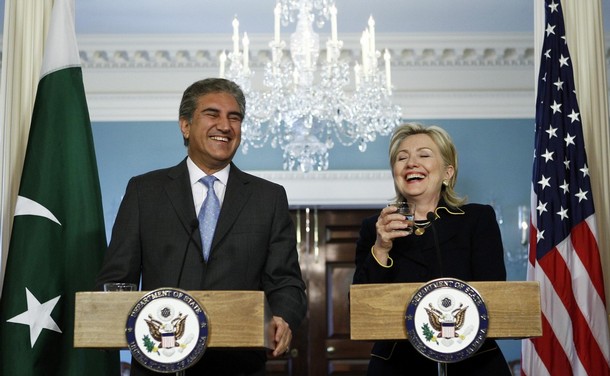
Last week’s visit of a very high level Pakistani delegation to Washington to meet with their opposite American numbers was at best a first step in a very long, testing and crucial journey essential to bringing a measure of peace, stability and even some prosperity to a volatile and dangerous region. To be blunt, the Americans did not deliver on a “game changer,” that is a response of sufficient magnitude to demonstrate to the Pakistanis serious intent to provide the support vital to success in keeping Pakistan safe and secure. And to be equally blunt, outside the military briefings, the Pakistani side did not provide a vision and plan of action with specific steps for both sides to be agreed on and then implemented.
Of course the rhetoric and public relations press releases were very positive. Many kind words were spoken on and by both sides. And harmony and signs of friendship were in obvious attendance. That said, what are the next steps beyond meetings?
If there is to be an effective strategic partnership, there needs to be a comprehensive plan of action that covers not merely the military and security components but the appropriate economic, financial, business, political and even social sectors as well. From my perspective, Pakistan has four critical needs:
- First, it must prevail in the existential battle against internal and external insurgents and religious radicals and zealots who are attempting to overthrow the government. This battle includes the war of ideas that currently is not being fought by our side against these forces of evil.
- Second, it must raise the standard of living of its people and provide a vision of hope for the future by improving its economy, infrastructure and institutions
- Third, it must make its system of governance more functional and effective driving out corruption and cronyism and replacing both with greater competence and respect for the rule of law.
- Fourth, Pakistan must be part of a regional solution for bringing greater and permanent measures of peace and stability among its neighbors.
In my mind, the greatest ticking time bomb is the some 70 or 80 million youth, 18 and under, with little, no or madrassas education, without jobs and no future prospects moving in greater numbers into urban areas where radicalization is omnipresent. At some stage that bomb will explode. It must be defused now.
With these four pillars of a comprehensive strategy, designing the specific actions and steps is not difficult. What is difficult is gaining agreement by the American and Pakistani governments and then implementing these steps giving all of the obstacles on both sides currently hampering effective joint action.
For example, it is well known what the Pakistanis need to improve the standard of living of its citizens—probably measured in terms of an additional $8-10 billion a year in trade and financial assistance. Much of that can come from the lifting of textile tariffs by the US (done by changing the quotas for China and India in favor of Pakistan that by the way could be smart leverage for the US in dealing with China and India and not affecting US jobs in the slightest) and granting GSP-plus by the EU. Also, Kerry-Lugar funding could be focused on a small number of very high impact projects such as power generation and infrastructure creation.
The needs of the Pakistan military are also well known. Helicopters and other lift in addition to greater numbers of electronic equipment for cell phone detection and location and similar capacity for monitoring the Internet have been requested for too long without success. Yet the US has literally thousands of helicopters in its National Guard and Reserve. If Pakistan is so vital to success in Afghanistan why some of these aircraft cannot be made available on a lend-lease sort of arrangement as was the case in fighting the drug war in Columbia? In other words, specific needs must be matched with the means for implementation.
My advice is for Pakistan to draw up a specific and comprehensive Plan of Action that can be delivered by the Prime Minister in person in his next visit here in April for the nuclear and non-proliferation talks.
Finally, Pakistan needs an effective public relations and strategic communications plan to serve two purposes. First, despite the efforts of a very effective embassy in Washington, little to no money is being spent to inform the US leadership and public of the realities in Pakistan. Too many Americans in and out of government see Pakistan as it was and not as it is. This absence of accurate information or misinformation must be overcome and done so now before it is too late. Second, Pakistan needs to fight and win the war of ideas at home against the radicals and extremists who seek to overthrow democracy and replace it with a harsh and unjust regime based on a perverted view of Islam. That cannot happen.
But to win, there must be a real plan. If Pakistan can craft one, it will be well on its way to prevailing in this existential war for its survival as a state, democracy and people.
Harlan Ullman is Senior Advisor at the Atlantic Council and Chairman of the Killowen Group that advises leaders of government and industry. This essay previously ran in Pakistan’s Daily Times. Photo credit: Reuters Pictures.
Image: quereshi-clinton.jpg
